The Chesapeake Log
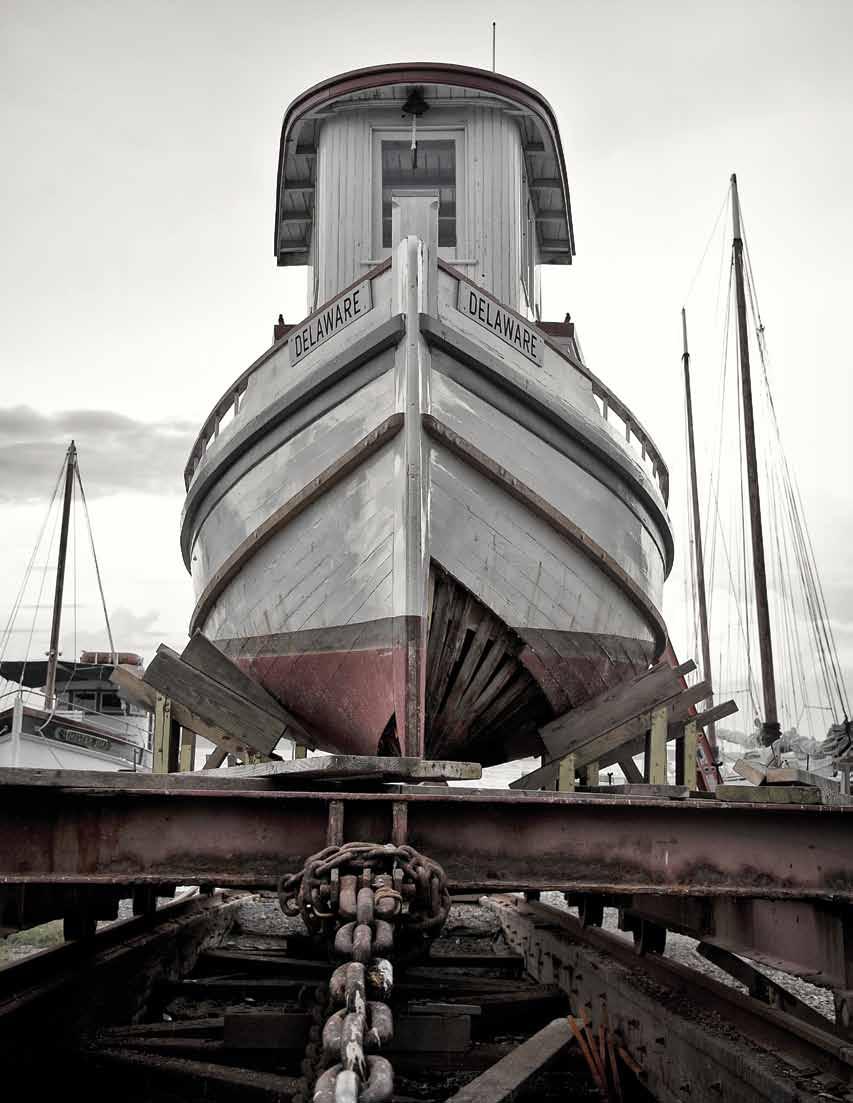
Winter 2012 A PUBLICATION OF THE CHESAPEAKE BAY MARITIME MUSEUM
President’s Letter
by Langley R. Shook
Currents
New staff members welcomed, Sultana’s replica John Smith shallop at the Museum, Tug Delaware historic restoration underway, Rise Up Coffee available in Welcome Center, and event highlights.
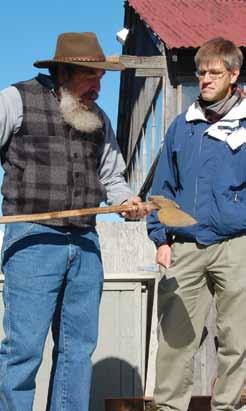
Curator’s Corner
Model tug Torrent restored.
By Pete Lesher
Lifelines
Get to know boatyard volunteer John “Doc” Hawkinson, MD. Check out upcoming volunteer training sessions.
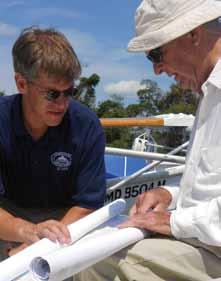
By Katie Willis
Education
What’s Fresh? Seasonal Selections from Education. Read about the new Oystering Legacy Tours, educational outreach initiatives, the winter/spring 2012 lecture series, and more.
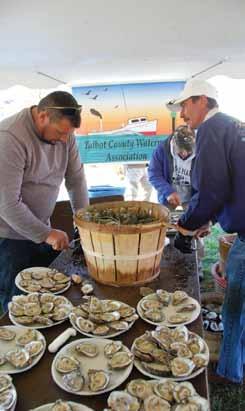
Lecture Series, Member Nights, Exhibit Explorations, and 2012 Save-the-Date event listings. 25 Annual Fund Honor Roll
Aboard the Barbara Batchelder
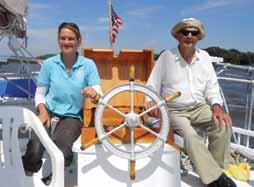
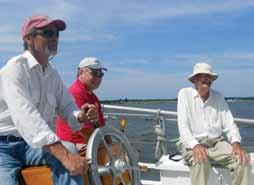
In the fall issue of The Chesapeake Log,
Mission Statement
The mission of the Chesapeake Bay Maritime Museum is to inspire an understanding of and appreciation for the rich maritime heritage of the Chesapeake Bay and its tidal reaches, together with the artifacts, cultures and connections between this place and its people.
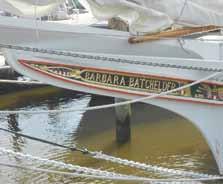
Vision Statement

The vision of the Chesapeake Bay Maritime Museum is to be the premier maritime museum for studying, exhibiting, preserving and celebrating the important history and culture of the largest estuary in the United States, the Chesapeake Bay.
Sign up for our e-Newsletter and stay up-to-date on all of the news and events at the Museum. Email havefun@cbmm.org to be added to our mailing list.
Don’t forget to visit us on Facebook! facebook.com/mymaritimemuseum
Follow the Museum’s progress on historic Chesapeake boat restoration projects as well as updates for the Apprentice For a Day Program. Chesapeakeboats.blogspot.com

Check out Beautiful Swimmers, a general education forum and valuable resource of stories, links, and information for the curious of minds. Beautifulswimmers.tumblr.com
By
Kate Livie Academy for Lifelong Learning announces winter semester.
By Esty Collette 15 Feature
On Deck with the Captain of the Rosie Parks
By
Meet the newest members of the Museum’s Perpetual Mariner’s Society, which recognizes supporters who have included the Museum in their estate plans.
Correction:
Restoring Navy Point
On The Rail
Updates from the boatyard: Delaware, Edna E. Lockwood, and Rosie Parks plus photos from the Parks family reunion at OysterFest.
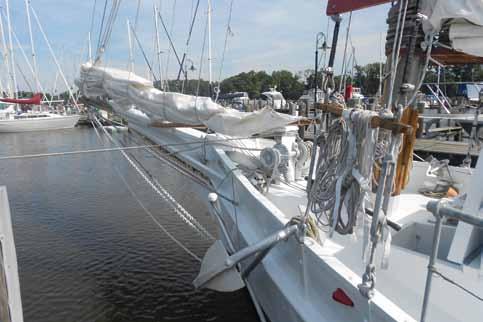
On page 20 of the 2010-2011 Annual Report, we erroneously omitted Bob Traynelis in the listing of volunteers who received special recognition during the 2010-2011 volunteer appreciation ceremony.
Bob logged an incredible 792 hours of service to the Museum last year, for which we are extremely grateful. Our sincerest apologies for the error and heartfelt thanks to Bob for his dedication.
The Chesapeake Bay Maritime Museum Navy Point, PO Box 636 St. Michaels, MD 21663 410-745-2916, cbmm.org
On the cover:
“Delaware on the Rail,” by fine art photographer Jeff Nicklason of Grasonville, MD. See more of his photography in the Museum store and online at Nicklasonphoto.com.
Editors: Tracey Munson & Marie Thomas
Creative Director: Marie Thomas Copy Editor: Mariana Lesher
Contributing Writers: Dick Cooper, Pete Lesher, Kate Livie, Mike Gorman, Katie Willis, Esty Collet, Langley Shook, Tracey Munson, Marie Thomas
The Chesapeake Log is a publication of the Chesapeake Bay Maritime Museum.
contents
Winter 2012 23 Calendar
3
4
11
12
13
Dick Cooper
By Langley Shook
19
1 winter 2012 THE CHESAPEAKE LOG THE CHESAPEAKE LOG winter 2012 2
“The Birthplace of Rosie Parks,” author Dick Cooper interviewed Irénée du Pont Jr. about his own skipjack, the Barbara Batchelder, also built by Bronza Parks in the mid-1950s. This past September, Museum President Langley Shook, Chief Curator Pete Lesher, Project Manager Marc Barto, and Shipwright Apprentice Jenn Kuhn were invited to sail on the Chester River aboard the Barbara Batchelder with Irénée and his wife Barbara, the skipjack’s namesake.
(top) The Barbara Batchelder looks very much the way it did when first built. (bottom left) Chief Curator Pete Lesher and Irénée du Pont. (right top) Project Manager Marc Barto at the helm with Museum President Langley Shook and du Pont. (bottom right) Shipwright Apprentice Jenn Kuhn takes a turn at the wheel with du Pont.
byLangleyR.Shook,President
Every one of us, as members and friends of the Museum, makes our own mark on the history, heritage, traditions, and culture of the Chesapeake Bay region. Our Museum is the book that safeguards these collective stories and shares their inspiration with the thousands of people who support and care about our work. Locals, tourists, watermen, and weekenders—the “come here’s” and the “from here’s”—all of us have a connection to this unique place.
Occasionally, the Museum is privileged to help assemble the elements that together preserve and enrich a particular family’s legacy. This November’s annual OysterFest will be remembered for more than just its record attendance of 2,500. Fifty-seven of our visitors were members of the Parks family, who came from as far away as New Mexico and Florida to celebrate the restoration of Bronza and Orville Parks’—and now the Museum’s—skipjack Rosie Parks. What began as a boat restoration project has evolved to help revitalize a family’s rich Chesapeake heritage and the legacies it carries forward.
Many of the Parks family in attendance had not seen each other in more than 40 years, and most of the great-great-grandchildren had never met. As the Museum’s Rosie Parks Project Manager Marc Barto said at OysterFest, “This shows that the Museum is not just about artifacts and old boats. We’re also about the people and stories behind every object in our collection. For Rosie, we’re not just restoring an old boat, we’re also reuniting a family. Now that’s pretty cool.”
OysterFest isn’t the only place we’re engaging people like you in Chesapeake cultures. With the Elf Classic Yacht Race, Frederick Douglass Day, Watermen’s Appreciation Day, the St. Michaels Concours d’Elegance, Maritime Monster Mash, and the James L. Stewart Memorial Grand Prix, we are a Museum that isn’t for a certain age, gender, race, or class of people. At the Chesapeake Bay Maritime Museum, you truly have a place where people from all walks of life can celebrate the Bay and the diverse people who have lived, worked, and played here for generations, and still do today.
This year, more than 1,000 people ventured out during a record-breaking, 103-degree heat wave to come to our signature event, the Chesapeake Folk Festival. The 1,000 guests at Watermen’s Appreciation Day barely skipped a beat during the torrential downpour, waiting it out under tents, eating steamed crabs and swapping stories about worse storms they’d weathered in years past on the Bay.
The Museum has seen more members at our events this past year than any time in recent memory, and your unwavering support reaffirms the critical importance of how our work is enriching lives. Your support allows the Museum to share how all of these intriguing stories intertwine into a patchwork of history, connecting people who otherwise would have little in common, and bringing them together in celebration of this special place.
Coming up in 2012, we have an exhibition on Chesapeake tugboats in the works; our winter/spring 2012 lecture series, “An Abundant and Fruitful Land: Foodways of the Chesapeake, Now and Then”; highly-focused docent training; and, of course, a wide range of inclusive special events appealing to diverse audiences. (See our calendar of events on page 23). I hope your own story will continue to unfold here at the Museum, as you add a new chapter to Chesapeake history.
Board of Governors 2011-2012
CG Appleby, Chair
Alan R. Griffith, Vice Chair
Joseph E. Peters, Vice Chair
Tom D. Seip, Treasurer
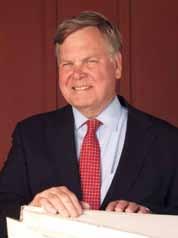
Mark S. Nestlehutt, Secretary
Paul Berry
Richard J. Bodorff
Harry W. Burton
Frederic N. Cross
William S. Dudley
David E. Dunn
Jocelyn W. Eysymontt
Anna W. Fichtner
Howard S. Freedlander
Dagmar D. P. Gipe
James P. Harris
E. Brooke Harwood, Jr.
Christopher A. Havener
Francis Hopkinson
Pamela Jana
R. Douglas Jurrius
Richard H. Kimberly
Peter M. Kreindler
William C. Millar
Geoffrey F. Oxnam
Bruce A. Ragsdale
Henry H. Stansbury
Benjamin C. Tilghman, Jr. Richard C. Tilghman, Jr. Alfred Tyler, 2nd Barbara Viniar
Langley R. Shook, President
Emeriti
Richard T. Allen
Margaret D. Keller
Breene M. Kerr
Charles L. Lea, Jr.
D. Ted Lewers
Fred C. Meendsen
John C. North II
Sumner Parker
Robert A. Perkins
James K. Peterson
Norman H. Plummer
John J. Roberts
Henry H. Spire
James E. Thomas
Joan Darby West
Donald G. Whitcomb
Museum Staff Museum Welcomes New Staff Members
Administration
Langley R. Shook, President, 4951
René Stevenson Director of Development & Assistant to the President, 4950
Tracey Munson, Vice President of Communications, 4960
Marie Thomas Communications Manager, 4953
Melissa Spielman, Director of Events & Volunteer Program, 4956
Ida Heelan Events Coordinator, 4944
Breene M. Kerr Center for Chesapeake Studies
Pete Lesher, Chief Curator, 4971
Richard Scofield, Assistant Curator of Watercraft, 4966
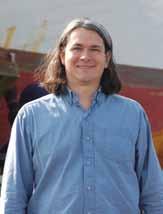
Rob Forloney Director of the Kerr Center, 4959
Kate Livie Director of Education, 4947
Eric Applegarth, Exhibits Specialist, 4945
Lynne Phillips, Collections Manager, 4972
Helen Van Fleet Education & Reservations Assistant, 4941
Michelle Zacks, Museum Folklorist, 4961
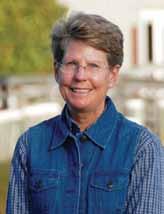
Constituent Services
Debbie Collison Membership Team Leader, 4991
Katie Willis, Visitor Services Team Leader, 4993
Emilie Knud-Hansen Membership/Development Assistant, 4955
Marty Smythe Museum Store Manager, 4963
Victoria Alexander, Museum Store Associate, 4962
Gloria Condrell, Museum Store Associate, 4962
Megan Fisher, Museum Host, 4945
Anne Robling, Museum Host, 4945
Maggie Robar, Museum Store Associate, 4962
Boatyard
Marc Barto, Rosie Parks Project Manager, 4967
Mike Gorman Vessel Maintenance Manager, 4967
Don MacLeod, Vessel Maintenance Assistant, 4967
Dan Sutherland, Boat Yard Program Manager, 4968
India Gilham-Westerman, Shipwright Apprentice, 4967
Jennifer Kuhn, Shipwright Apprentice, 4967
Bud McIntire, Shipwright Apprentice, 4967
Ken Philips, Shipwright Apprentice, 4967
Finance
Jean Brooks, Vice President of Finance, 4958
Brenda Faulkner Director of Human Resources, 4948
Digie McGuirk Accounting/HR Assistant, 4957
Operations
Bill Gilmore Vice President of Operations, 4949
John Ford, Facilities Manager, 4970
Lad Mills, Boat Donations Program Manager, 4942
Donna Fairbank, Facilities Custodian, 4969
Sam Fairbank, Facilities Maintenance Assistant, 4969
Joseph Redman Facilities Maintenance Assistant, 4969
To contact, dial 410-745, and the number listed.
To email, use the first initial, full last name @cbmm.org.
Jean Brooks of St. Michaels, MD, has joined the Museum as the new vice president of finance and administration. Before moving to St. Michaels a year ago with her husband, Jean had a 30-year career in the New York area in accounting, finance, and business development with, in reverse order, HewlettPackard Finance Services, CIT Group/AT&T Capital, Chase Manhattan Bank and Price Waterhouse. Brooks is a CPA with a degree in accounting, magna cum laude, from St. John’s University and an MBA degree in finance from Pace University. In addition to her responsibilities as the Museum’s chief financial officer, Brooks will oversee human resources, visitor services (including the marina), museum store and e-commerce development, and risk management. She also will coordinate and direct grants research, writing and administration. Brooks is an avid sailor and member of the Miles River Yacht Club where she serves on the finance committee.
Robert Forloney of St. Michaels, MD, has returned to the Museum as director of the Kerr Center for Chesapeake Studies. Forloney is the Museum’s previous director of education and returns after a leave of absence following the birth of his twin sons. Forloney’s responsibilities include developing partnerships with com munity organizations and cultural institutions, oversight of the Museum’s internship program as well as ensuring that the Museum’s research is incorporated into dynamic public programs and exhibits.
Debbie Collison of St. Michaels, MD, has joined the Museum as the new membership team leader. Collison’s responsibilities include enhancing the member experience through programming and outreach initiatives. She brings more than 30 years of management experience and community service to her position. Collison has served on the boards of several non-profit organizations, including the Chesapeake Center, Talbot Mentors, and Computer Literacy for Kids. She is a member of the Harbourtowne
Ladies’ Golf Association, High Hopes Investment Club, and St. Luke’s United Methodist Church, and volunteers with Waterfowl Festival, Talbot Partnership, Habitat for Humanity Choptank, and the St. Michaels Annual Crop Walk. Collison earned her BA with honors in liberal arts from Hood College in Frederick, MD, and has lived along the Chesapeake since 1990.
3 winter 2012 THE CHESAPEAKE LOG THE CHESAPEAKE LOG winter 2012 4
President’s Letter
India Gilham-Westerman of Port Townsend, WA, has joined the Museum as a shipwright apprentice.
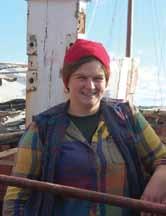
Gilham-Westerman begins her apprenticeship working on the restoration of the skipjack Rosie Parks. She worked over three Alaska fishing seasons aboard charter and commercial fishing vessels, gill-netting for salmon and charter fishing for halibut. She also worked on the restoration of Tres Hombres in Den Helder, Netherlands, before sailing the brigantine in the North Sea and Europe.
Gilham-Westerman holds an associate’s degree in wooden boatbuilding from the Northwest School of Wooden Boatbuilding in Port Hadlock, WA, and a bachelor of science degree in math from Purdue University in West Lafayette, IN. During her one-year apprenticeship, Gilham-Westerman is living in St. Michaels.
Ken Philips of Port Townsend, WA, also has joined the Museum as a shipwright apprentice.
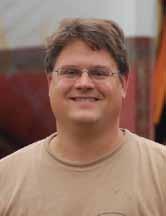
Philips recently earned his associate’s degree in wooden boatbuilding from the Northwest School of Wooden Boatbuilding in Port Hadlock, WA.
He holds a bachelor of business administration degree from the University of Wisconsin—Eau Claire. Prior to attending boatbuilding school, Philips worked in Philadelphia’s financial services district. He has sailed the Chesapeake aboard a 1978 Saber 28 since 2004.
Philips’ apprenticeship begins with the restoration of the tug Delaware. He currently resides in St. Michaels, MD.
Sultana’s Replica John Smith Shallop Now at the Museum
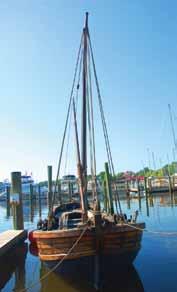
14th Boating Party Gala Fundraiser
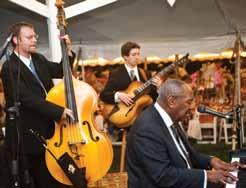

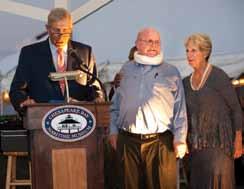
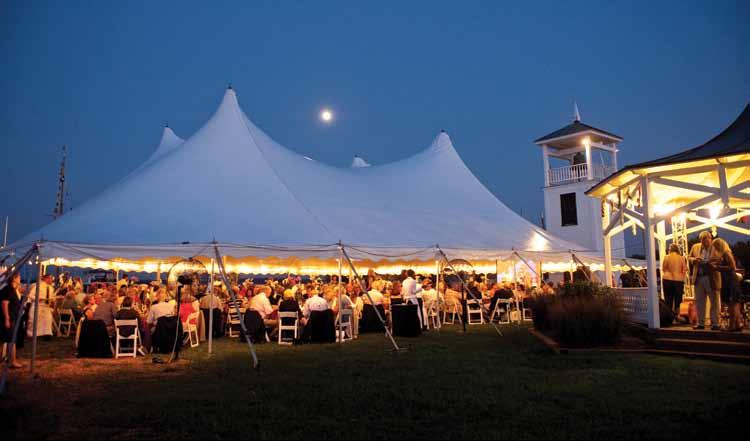
Saturday, September 10
Sultana Projects’ replica John Smith shallop is now on display along the St. Michaels Harbor just outside the welcome center. Built in 2005, the John Smith shallop is a full-scale replica of the small open boat, or “shallop” used by Captain Smith to make the first detailed European exploration of the Chesapeake Bay in 1608.
The original shallop was a small, shallow-drafted kit boat, made in two halves that could be pulled out of the hold of a larger ship and quickly put together to explore the creeks and rivers of the New World.
The two-part replica shallop, constructed of oak and Osageorange (also in two parts), went on to make a full retracing of John Smith’s 1608 voyage as part of Sultana Projects’ Captain John Smith Four Hundred Project.
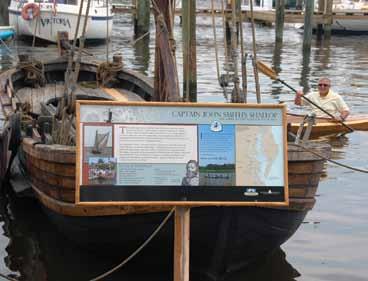
The shallop crew, made up of 12 men and women, rowed, sailed, and lived in the open vessel during the reenactment, as Smith’s crew would have in 1608.
5th St. Michaels Concours d’Elegance
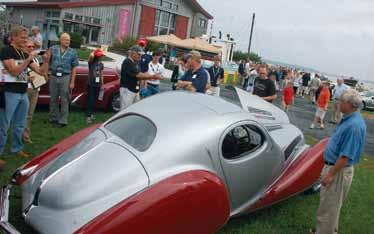
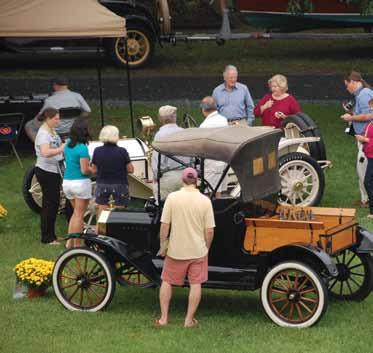
currents 5 winter 2012 THE CHESAPEAKE LOG THE CHESAPEAKE LOG winter 2012 6
Sunday, September 25
The 14th Annual Boating Party Gala Fundraiser “Dressing the Ship” welcomed more than 600 guests and raised $190,000 to benefit the Museum. Guests enjoyed dinner and dancing to the Freddy Cole Jazz Quartet (pictured left) and The Golden Gup. A special thanks to co-chairs Amy and Paul Berry (pictured above, center) and the Boating Party Committee for their dedication and tireless efforts. (right) The first Candy Backus award was presented by Vice Chairman of the Board Joe Peters to Bob and Kay Perkins for their leadership and in appreciation for Candy’s own devotion and hard work to make the Museum’s Boating Party a success.
Tug Delaware’s Historic Restoration
Now Underway
In recognition of her upcoming centennial, the tug Delaware is now being restored to her 1912 appear ance in full public view. Delaware is a rare example of a typical early 20th century wooden river tug. Built in 1912 in Bethel, DE, by William H. Smith, Delaware measures 39’8” x 11’4” and is now a floating exhibit at the Museum.
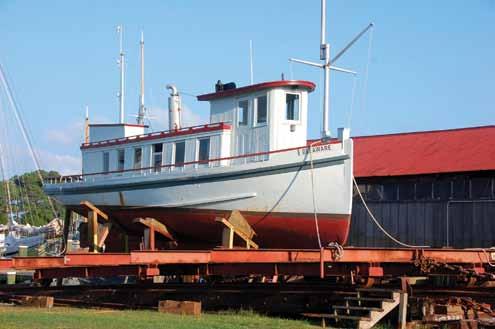
Delaware is a product of Bethel’s great age of wooden ship and boatbuilding. Apart from the 1900 ram schooner Victory Chimes (formerly Edwin and Maud), Delaware may be the only survivor. In 1929, the tug was bought by James Ireland of Easton, MD, who was in partnership with John H. Bailey in a marine construction business. Later, Bailey acquired sole interest in
the tug, when she became a common sight around the Upper Eastern Shore, engaged in building bulkheads and docks until she was laid up in the late 1980s. Delaware hauled scows on Broad Creek, often laden with lumber,
and towed ram schooners to and from Laurel. Occasionally, she carried parties of young people to Sandy Hill for day trips on the Nanticoke River. (Read more on page 19).
Rise Up Coffee Now Offered in Welcome Center
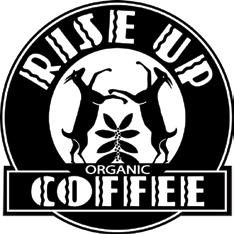 By Katie Willis
By Katie Willis
Sharing a love of the Chesapeake Bay and the communities served, Rise Up Coffee is now donating coffee to serve in the Museum’s Welcome Center. For the local coffee company’s owners Tim and Abigail Cureton, giving back to their community is nothing new.
Rise Up Coffee sponsors various local and global charitable organizations, including the Peace Corps, for which Tim has a particular affinity due to his previous Peace Corps service in the Pacific. Their charitable giving fits right into their mission to “Serve the best coffee. Make the most friends. Do the least harm.”
“Both the Museum and Rise Up Coffee serve a unique and close community,”
says Visitor Services Team Leader Katie Willis. “Our missions are similar; Rise Up promotes community through the global reach of coffee, and the Museum promotes community through sharing the cultural heritage of the Chesapeake Bay and the people who live here.”
As one of the Museum’s Skipjack Fleet business members, Rise Up staff enjoy extended Museum member benefits including discounts on classes and programs, invitations to exclusive members-only events, and more. Businesses are encouraged to join the Museum as members by contacting Membership Team Leader Debbie Collison at 410-745-4991 or emailing dcollison@cbmm.org.
2nd Watermen’s Appreciation Day
Saturday, August 14
Despite heavy rain, more than 1,000 people came to the 2nd annual Watermen’s Appreciation Day to support the Talbot County Watermen’s Association (TCWA).
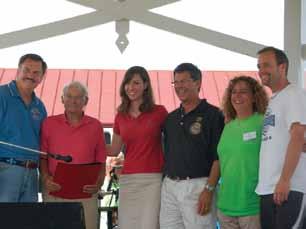
(left) The boat docking contest draws a big crowd. (below, from left) Brothers Guy and Joe Spurry, (owners of Bay Hundred Seafood and Chesapeake Landing Restaurant) sponsors of the event, helped to serve steamed crabs.
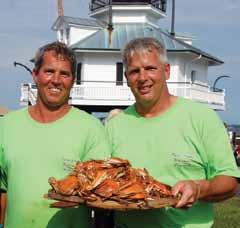
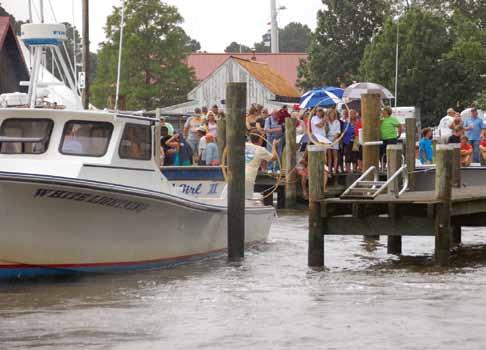
(middle) Senator Rich Colburn, Thomas P. Jones (recognized as oldest working waterman in Talbot County, age 82), Delegate Jeannie Haddaway-Riccio, Delegate Jay Jacobs, TCWA’s Lisa Gowe, and Edgar Hansen, from the Discovery Channel’s hit show “Deadliest Catch.”
(right) Edgar Hansen and PT Hambleton, a winner in the boat docking contest.
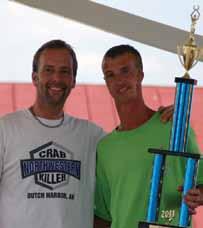
14th Boat Auction

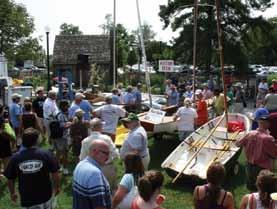
Saturday, September 3
The 14th annual Charity Boat Auction drew a crowd of 1,600 people and sold 90 boats, ranging in size and performance from sailing dinghies to cabin cruisers. More than $120,000 was raised to support the Museum and its mission. (right) Museum Board Member Paul Berry serves as auctioneer.
currents 7 winter 2012 THE CHESAPEAKE LOG THE CHESAPEAKE LOG winter 2012 8
29th Mid-Atlantic Small Craft Festival
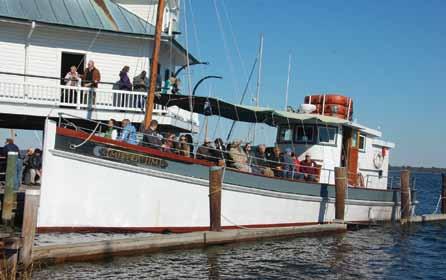
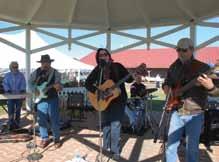
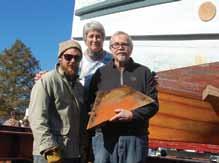


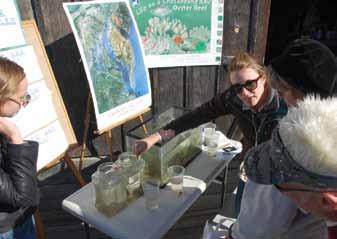

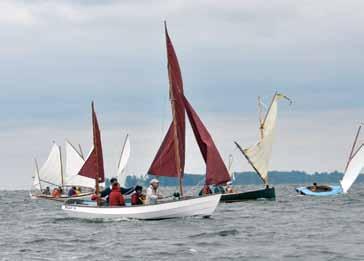
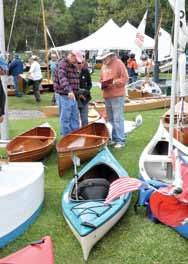
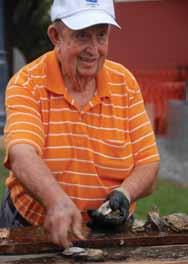

Maritime Monster Mash
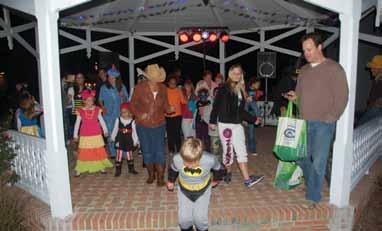
This year’s OysterFest set an all-time record with 2,500 people in attendance. Festival-goers enjoyed live music, oysters and other foods, children’s activities, boat rides, demonstrations, and an oyster stew competition won for the second consecutive year by Chef David Hayes of Harbour Lights at St. Michaels Harbour Inn, Marina & Spa. It was at last year’s OysterFest that the skipjack Rosie Parks restoration project was announced. A year later, 57 members of the Parks family came to OysterFest for a family reunion and to celebrate the rebirth of the Rosie in memory of her builder, Bronza Parks and his brother and Rosie’s Captain, Orville Parks. The family presented the Museum with a selection of Bronza’s and Orville’s tools, now part of our permanent collection. See photos of the Parks family reunion on page 22 and read all about the latest progress on the Rosie project.
(top, clockwise) The Talbot County Watermen’s Association served oysters raw and steamed. The Mister Jim was packed for an ecology cruise. Vessel Maintenance Manager Mike Gorman and new Museum members Brigitte and David Phillips of Lancaster PA, hold a section of the old floor of the tug Delaware. David is the great-grandson of Delaware’s builder William H. Smith. B-Natural entertained crowds for the day.
(bottom, from left) Pres
In the front row are
9 winter 2012 THE CHESAPEAKE LOG THE CHESAPEAKE LOG winter 2012 10 currents
Saturday & Sunday, October 1 & 2
The 29th annual Mid-Atlantic Small Craft Festival welcomed 268 registered participants, 170 boats, and more than 1,000 in attendance over the course of the weekend. The festivities kicked off with an oyster roast and included races, a swap meet, music, and scenic river cruises.
Friday, October 21
Harding, Chief Curator Pete Lesher, Shipwright Apprentice India Gilham-Westerman, Project Manager Marc Barto, Tom Parks, and Shipwright Apprentices Bud McIntire and Jenn Kuhn on top of Rosie’s doghouse during the presentation of Bronza’s and Orville’s tools.
Rosie Parks supporters Earl Brannock and Ginger Martus, Maxine and Bill Millar, and Parks family member Mary Parks Harding. Director of Education Kate Livie explains the vital importance of oysters to the health of the Chesapeake Bay.
Model Tug Torrent Restored
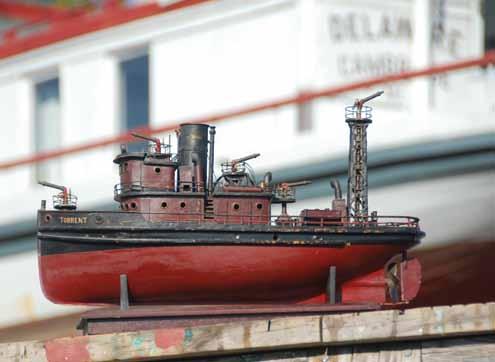 by Pete Lesher
by Pete Lesher
The city of Baltimore, with its port facilities sprawling around the shores of the Patapsco River, has long relied on a fleet of fireboats to protect valuable waterfront property. The largest vessel to serve the city was the appropriately-named Torrent, which served along with fireboats named Cataract, Deluge, and Cascade.
Stationed at various points around the harbor, at least one fireboat could reach any waterfront location in the city within 10 minutes. Built on the hull of a steam tug, Torrent was launched in 1921 and served until 1956 when she was replaced by a modern diesel fireboat.
Professional firemen typically work long shifts, but then enjoy the reward of long stretches of off-duty time, and the situation was no different for the Baltimore Fire Department’s Marine Division.
Carl T. Allison, an engineer on the Torrent in the 1930s and 1940s, used his leisure time to build a model of the boat he served aboard.
Although not a scale model—the model is proportionately a little too wide and too deep for its length—many of the technical details are included. This atten tion to detail is typical of “sailor-made” models, those constructed by a member of a vessel’s crew who knew it intimately.
The model features not only the five monitors (nozzles) mounted on the main deck, pilot house, aft deck house, and tower, but a grate below the waterline for the water pump intake, discharge gates where hoses can be attached, and other such details.
The model came to the Museum with several parts missing or separated, and Ed Thieler, a volunteer member of the museum’s Model Guild, conserved it for exhibit. The Museum is planning a tug exhibit to open in spring 2012, where this model of a specialized tug will be presented for the first time.
The model was the gift of Mildred T. Allison in memory of Calvin F. Allison.
VOLUNTEER Training & Events
Contact Melissa Spielman to register at mspielman@cbmm.org or by phone at 410-745-4956. Current volunteers may register on the volunteer website.
General Tour Training
For volunteers interested in becoming docents, this training provides the basics of content, interpretive skills, and critical thinking needed to guide a group on a general tour. No experience necessary, although an interest in public speaking is critical. All sessions are mandatory for course completion.
February 7, 9, 14, 16, 21, 23 10am-12:30pm
Van Lennep Auditorium (VLA) Tour
and School Program Docent Training
Each program has two days of training. Both sessions are necessary to complete the training successfully, and it is suggested that new volunteers complete the general tour training before attending these program-specific trainings.
Crab Cakes
March 6 & 8, 10am in the VLA
Bay Bounty Tour
March 3 & 15, 10am in the VLA
Bay Discovery Tour
March 15 & 20, 10am in the VLA
Oystering Legacy Program
March 13 & 15, 2pm in the VLA
Volunteer Education Field Trips
The field trips will be on a pre-regis tration, car-pool basis, with entrance fees for institutions covered by each volunteer.
December 5, 2011
Historic London Town, Edgewater
January 10, 2012 Location to be announced.
Volunteer Profile
by Katie Willis
By his own account, John A. “Doc” Hawkinson, MD, is not the type of person who needs to head to Florida every winter. In fact, he says, “I’m perfectly happy staying through the seasons. I love it here.”
John’s time on Maryland’s Eastern Shore began in 1964, when he moved from Philadelphia to continue his obstetrics and gynecology practice with the Memorial Hospital at Easton. From 1964 to 2000, John delivered, to his best guess, around 3,000 babies––including the author of this article.
Although his medical practice was a primary motivation for moving, John’s love for sailing, and “messing about in boats,” were also chief reasons. Since retiring in 2000, his love for boats brought him to the Museum, where, since 2009, he’s volunteered more than 2,000 hours by offering skilled assistance to Apprentice for a Day (AFAD) public boatbuilding participants.
His fascination for boats began in Minnesota at age five, and continued with Chesapeake Bay cruising, off-shore sailboat racing, and log canoes. He spent two years in the U.S. Navy, one of which was spent on a destroyer primarily stationed in Charleston, South Carolina.
After the Navy, John studied medicine at Temple University in Philadelphia, where he received his training in obstetrics and gynecology, and completed his residency. John and his family moved to the Eastern Shore after the completion of his medical training. He remembers a time when the only buildings on Navy Point were a seafood packing plant and
(above) You can usually find John A. “Doc” Hawkinson and his sidekick Scout in the boatshop.
(right) John takes a ride on the bugeye he and Sidney Dickson built, the Katherine May Edwards.
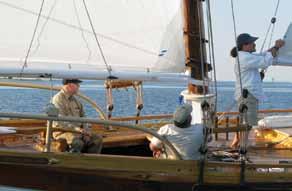
the three historic houses that now serve as the Museum’s administrative buildings.
After retiring in 2000, John decided to take his love of boats to a new level, in what he calls, “the pendulum swing from sailing to boatbuilding.” John assisted local resident Sidney Dickson in building a brand new bugeye, the Katherine May Edwards
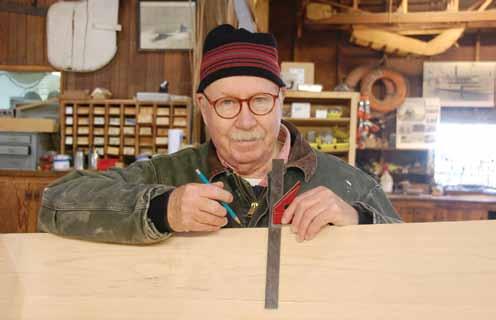
“The first trees were cut in 1980 and the logs partially assembled, but we both had an occupational handicap––we had to work for a living,” recalls John. The project resumed in 2002 and was completed by 2008.
“Building a boat is one step at a time: each time you get another board on it is rewarding,” he adds. It was also at this time John acquired a sidekick, his dog Scout, who accompanies him to the Museum’s boatshop every day.
Once the bugeye was completed, he was ready for something new and began volunteering for the AFAD program.
His focus again shifted from building a
new boat, to restoring boats and interpreting the process to Museum guests. The AFAD program is an on-going program that gives anyone interested in boatbuilding the hands-on experience necessary to take their interest to the next level or to hone a particular skill.
“We learn just as much from the participants as they learn from us,” says John, whose enthusiasm and desire to perfect his boatbuilding skills make him a favorite around the boatyard.
“There are always repairs to be made to a boat, so there can’t be much difference between repairing and building anew. The concept of constructing a useful vessel greatly intrigues me—it’s always a pleasure to look at a boat and see her come together—if her sheer line is attractive, she’s most likely a good boat.”
Want to volunteer or participate in the AFAD program? Call 410-745-2916 for more information.
11 winter 2012 THE CHESAPEAKE LOG THE CHESAPEAKE LOG winter 2012 12 lifelines curator’s corner
What’s Fresh?
Seasonal Selections from Education
by Kate Livie
Fall for the education department meant school tours—and lots of ‘em! Students from all over Maryland and beyond flocked to campus to learn about watermen and their boats, Bay ecology, the history of lighthouses, and how a professional picks a crab. Each of these students were taught by the Museum’s committed corps of docents, who have received free training on everything from teaching techniques, to Bay flora and fauna, to Chesapeake history and ship con struction, and more. This fall, those docents also learned how to lead a new tour focusing on one of the Museum’s most important projects—the Rosie Parks restoration.
Offered to adults as well as students, the “Oystering Legacy” tour follows a 400-year relationship with Crassostrea virginica—the Eastern oyster. Beginning with the Native Americans at first contact, the tour interprets a Bay in which John Smith noted “oysters thick as stones” to the boom-time 19th-century oystering “Gold Rush of the Chesapeake” through hands-on activities and exhibit exploration.
Students and adults opened spat cages and learned about the challenges and future of oystering in the Chesapeake today, and applied their newly-minted historical expertise as they swung a hammer or wielded a paintbrush at the Rosie Parks restoration site with Project Manager Marc Barto and his
team of skilled shipwrights. Through the “Oystering Legacy” tour, students of all ages learn about the Chesapeake Bay where Rosie sailed, the oysters she harvested, and the enduring spirit she carries forward.
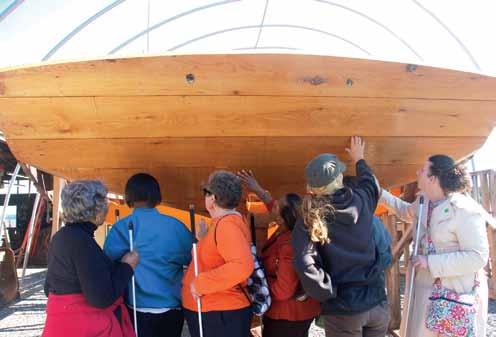
Off campus, educational outreach continued with an eight-week, Chesapeakefocused afterschool program open to all Queen Anne’s County 6-8th grade students. Held at The Gunston School on the Corsica River, eight students learned about how people adapted to the Chesapeake, from the time of the Indians to today. Canoe trips, oyster nursery exploration, seining, history research and discussions, and walks through the woods kept the students in contact with today’s Bay as they studied the changes and challenges impacting the Chesapeake over time.
Looking ahead, as the chill keeps all but the hardiest sailors off the water, the Museum has lots going on to keep the cabin fever away this winter.
This year’s winter/spring 2012 lecture series, “An Abundant and Fruitful Land: Foodways of the Chesapeake, Now and Then” begins in January (see our calendar on page 23), and from the historic to the modern, there’s a program to “feed your soul.”
Taste an original 18th century cocktail, the rum shrub, and learn about taverns and spirits of the Colonial Chesapeake; hear about how modern innovational Chesapeake family farms are moving from corn and soybeans to vineyards and grass-fed beef; discuss how eating and cooking sustainably can impact the future of Chesapeake watermen; and see the history of African American Chesapeake cuisine come alive over an open hearth.
And don’t forget to check out the new education blog, “Beautiful Swimmers,” a general education forum, as well as a valuable resource of stories, links, and information for the curious of minds. Beautifulswimmers.tumblr.com.
Academy for Lifelong Learning
Something for everyone in the winter 2012 line-up
by Esty Collette
The Academy for Lifelong Learning (ALL) is offering an abundance of courses this winter. History buffs can enjoy “History of American Art Part II,” which will cover American art from the Civil War through Winslow Homer. Local history will be represented by the courses “Talbot County History,” and the “History of Log Canoe Racing.”
Good discussions can be counted on in the three courses: “The Politics of Evolution,” “Great Decisions,” and Sam Barnett’s course entitled “Have You Met Satan Yet?” For those with literary interests, a course on French authors in translation will be led by Margot Miller. John Miller will facilitate the course “I Believe,” in which participants can write and share
essays describing the core values that guide their daily lives.
Joan Katz will lead the “Memoir Writing Group” for individuals who wish to learn about putting together their memoir either through writing their story or with less traditional alternatives such as art works, quilts or scrapbooks. Scott Friedman, MD, a cardiologist with Chesapeake Bay Cardiology, will give a talk called “When is Coronary Stenting Appropriate?” Opportunities to meet with local authors and tour sites of interest will also be available.
ALL is a nonprofit, volunteer-run organization committed to the enrichment of life through continuing education. For more information about
ALL, to receive a catalog for the winter 2012 semester, or to learn about other upcoming events, call the Museum at 410-745-2916 or find us on Facebook. A full course schedule can be viewed online at cbmm.org/all.
ChesAdventures
Children ages 4-9 can fill their Saturdays with two hours of fun-filled and challenging hands-on games, arts and crafts, and story telling at the Museum’s ChesAdventures Program (formerly Saturday for Kids).
All sessions are Chesapeake-themed with space limited.
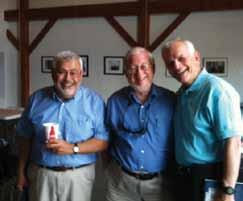
Pre-registration is required, call Helen Van Fleet at 410-745-4941 to reserve a spot.
Visa, Mastercard, and Discover accepted.
Gift certificates available. $12 for members, $15 non-members.
BUGS AND SPIDERS
January 14
Fun to find, fun to make!
BRIGHTEN UP WINTER
January 21
Art projects with all things shiny.
WINTER WATER BIRDS
January 28
Wanna make a duck?
A GLACIER MADE THE BAY
February 11
We’ll make our own gooey version of that ice floe.
JELLYFISH
February 18
Love ‘em or hate ‘em, they are cool and beautiful.
WIND
February 25
Warm or cold, we’ll look at wind power inside and out.
Morning sessions, 10am–12pm, ages 4–6. Afternoon sessions, 1–3pm for ages 7-9.
13 winter 2012 THE CHESAPEAKE LOG THE CHESAPEAKE LOG winter 2012 14 education
A group of visitors from the Blind Industries and Services of Maryland feel the transom of the Rosie Parks during a group tour this past October.
ALL’s Sam Barnett, Ron Lesher and Don Berlin enjoy an after class discussion.
On Deck with the Captain of the Rosie Parks
By Dick Cooper
It was a cold winter’s day on the decks of the skipjack Rosie Parks as she dredged for Chesapeake oysters. Suddenly, the long boom accidently jibed, sweeping Captain Orville Parks from the after-deck into the frigid water. His crew quickly pulled him back on the deck thinking they might get a respite from the raw weather.
First Mate Theodore Cephas remembers saying, “Well, we’ll get to go home early today. But Captain Orville, he went down in the cabin, took them wet clothes off, put on a set of oil skins, nothing underneath them, and we drudged all day long.”
Cephas, now 80, of Vienna in Dorchester County, the last living member of the Rosie Parks regular crew, says he worked side-by-side with the legendary Captain Orville from 1956 until 1974. Captain Orville’s niece, Mary Parks Harding, daughter of Bronza Parks, builder of the famous skipjack, says Cephas was “Uncle Orville’s right-hand-man. If the Rosie Parks moved, Theodore Cephas was on board.” Cephas says he was a
young, out-of-work farmhand looking for a winter job when he met Captain Orville in Cambridge.
“I was walking along the wharf one morning looking for a job,” Cephas recalls. “About 5 o’clock in the morning, Captain Orville come up and asked me if I want a job and I said yes. He said I got a drudge boat. I said I don’t know nothing about drudgin’. He said, come on, get in the car, and we went down to Wingate. Rosie Parks, she was up on the railway, I helped put her overboard. I was one of the first ones.”
Sitting on a couch in the living room of his home, Cephas, still lean and waterman strong, strokes his slight beard with a hand worn into hard leather by a life of physical labor as he thinks back on his days as a Chesapeake Bay oysterman.
“That was hard work,” he says, adding, “cold too.” He says he kept up with the Rosie Parks after Captain Orville sold it to the Chesapeake Bay Maritime Museum in 1975, but he stopped checking in on her about six years ago
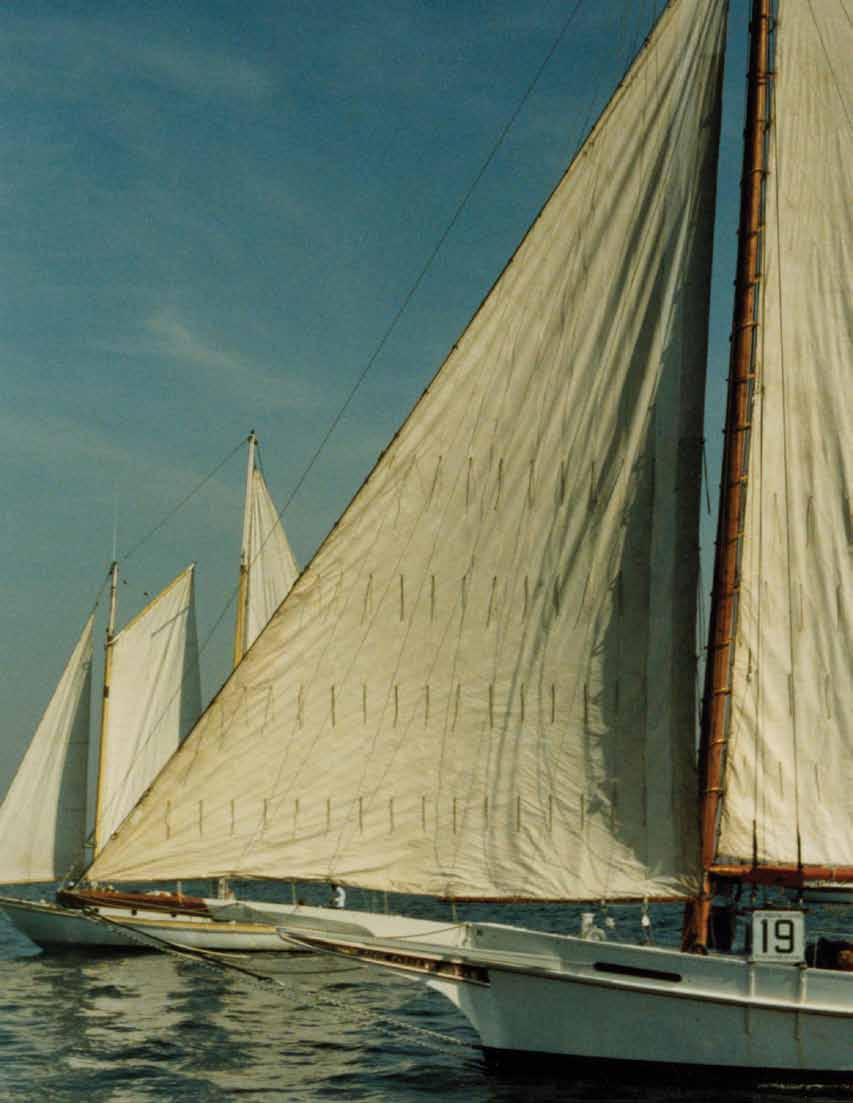
when Rosie’s deterioration became too much to witness.
“It was a shame they let her go down so,” he says. Cephas has heard about the rebuilding of Rosie Parks now in full swing at the Museum. Marc Barto, project manager overseeing the rebuilding of the 56-year-old skipjack, has begun the exacting job of replacing and repairing her deck beams.
The centerboard trunk has been rebuilt and her cabin lifted off the deck. Barto hopes to save the original cabin as he con stantly looks for ways to save as much of the boat as possible during the three-year restoration and educational project.
“I might drive up there and take a look at her,” Cephas says. (Cephas did come back to see Rosie at this year’s OysterFest, see page 22.) Looking back, Cephas says he remembers the Rosie as the queen of the oyster fleet.
“He kept a good rig,” he says of Captain Orville. “He was one of the best on the Bay. He was the Admiral, Governor Tawes made him that,” referring to the honorific “Admiral of the Chesapeake”
15 winter 2012 THE CHESAPEAKE LOG THE CHESAPEAKE LOG winter 2012 16
feature
Rosie, circa the late 1980s during the Museum’s Traditional Boat Races.
bestowed on distinguished watermen over the years.
“He knew every trick,” Cephas says. “He’d catch oysters on a state road.” Unlike a lot of captains who tended to stay near their home ports, Orville Parks sailed all over Maryland’s half of the Bay hunting for oysters.
“At the end of the day, when we wasn’t working, he’d be laying down there in his locker thinking about the next move,” Cephas says. Captain Orville would steer his boat from her home port on Cambridge Creek to Wingate, Annapolis, Deal Island, Tilghman Island, Fairlee Creek, and Solomons Island to find his prey.
Cephas remembers the call he received from his old captain. Captain Orville told Cephas he wanted him with him when he delivered Rosie Parks to her new home. “It was a sad day. When we left he cried just like somebody shot him.”
“Anywhere there’d be oysters, he’d be there,” Cephas says. “He would be out on the Bay night and day and I never seen him lost.”
He says the captain learned a hard lesson in the winter of 1957 when Rosie was ice-bound in Cambridge.“I drudged with him so many years, we never got froze up but that one time,” Cephas recalls.
“He says, ‘Boys, you’ll never catch me in here again.’ He was smart. When we’d get ready to freeze up he would leave and go to Solomons Island.” Cephas remembers the boom days of the late 1950s and early 1960s when oysters were plentiful.
“Oh my lord, one year, not sure what year it was back in the 60s and we was drudging over off Chesapeake Beach,” he says. “They didn’t have no limit. One time we had 350, 400 bushels a day. We would unload twice a day.”
Orville Parks’ crew was loyal to him because they knew they could make money working for him. They also knew that if they had a bad spell, the Captain would do right by them. “Lot of times we didn’t make much, but he would always give you something to take home.”
Cephas says that Captain Orville “liked the dollar. He liked money, and he had some too. Captain Orville didn’t fool with nothing that didn’t have money in it.” Even when he was racing against other skipjack captains for bragging
rights, he always had his eye on the prize money, Cephas says. “If he didn’t win that race, he could be pretty hard to get along with.”
But Rosie won most of her races because Captain Orville “kept his boat in firstclass shape, he had light sails on her and he would outsmart most of them,” Cephas says. In the later years of their friendship, Cephas recalls when Captain Orville wasn’t feeling well, he would take the helm. In 1974, Captain Orville had a heart attack and his doctor told him it was time to get off the water. Cephas remembers the call he received from his old captain. “He said, ‘I’m going to get rid of her.’ I said, ‘No you’re not.’ He said he was selling her to the Museum in St. Michaels.”
Captain Orville told Cephas he wanted him with him when he delivered Rosie Parks to her new home. “It was a sad day. When we left he cried just like somebody shot him.”
Orville Parks, captain of the Rosie Parks—the skipjack named for his mother—was ashore at the age of 78. He had worked the Chesapeake’s waters since he was a boy. He died less than a year after selling the Rosie Parks to the Museum in 1975. Cephas says he retired from oystering in 1979. Now, at the age of 80, he is retired from farming and only works one job as a caretaker on a Dorchester County farm, cutting grass and tending to chickens.

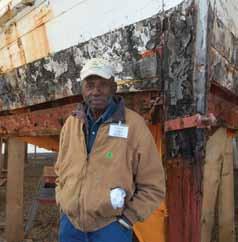
On November 14, we broke ground on Navy Point to begin replacing the last and most exposed section of rotted bulkhead along the Museum’s Miles River shoreline. The original wooden bulkhead was installed in 1970, and has far exceeded its expected 25year lifetime. In its deteriorated state, the existing bulkhead releases sediment into the harbor with every rainfall and leaves scarring sinkholes in the ground that are hazardous to visitors.

The decayed wooden bulkhead will be replaced with modern, more durable vinyl sheathing that has a 40-year lifespan. New amenities also will be added to the marina for the enjoyment of our boating members, including a new finger pier and three mooring pilings adjacent to the At Play on the Bay exhibit building, and upgraded electric and water service.
We’ll also install more living shoreline opposite the restrooms and showers near the boatshop. The Museum already has installed a living shoreline near the small
boat shed––a restored wetland providing natural habitat and filtering runoff while preserving the shoreline’s integrity.
The bulkhead from Honeymoon Bridge to the Crab Claw restaurant and along Fogg’s Cove have been replaced.
This final phase of bulkhead work has begun at the marine railway, and will proceed around the Hooper Strait Lighthouse, whose deck will be replaced, and over to Fogg’s Cove near the At Play on the Bay exhibit building.
To address the remaining deteriorated bulkhead, the Museum has secured almost $300,000 of Maryland State funding––about half the total project cost––leaving $300,000 of matching funds that must be raised. Despite not having all the necessary matching funds already in place, doing this work now was necessary to avoid the risk of losing the state grant money.
Talbot County has over 600 miles of shoreline––said to be the most of any county in the entire United States––
yet public access to the water is scarce. The Museum’s beautiful waterfront campus at Navy Point––its most valuable physical asset––may be the most recognized and most frequently visited place on the Eastern Shore for public access to the water.
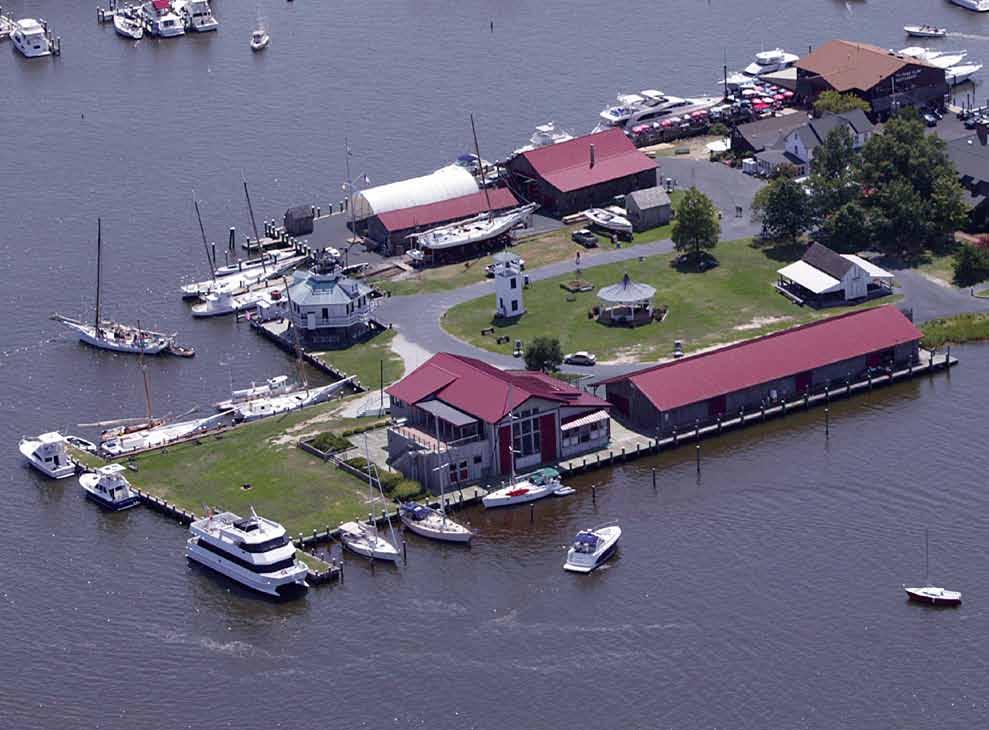
The Museum is perhaps the biggest tourist attraction from the Bay Bridge to the Atlantic Ocean and from Wilmington to Norfolk. This long postponed facelifting of the Museum’s shoreline will be finished before next spring. For more information about the project and how you can help support it, contact René Stevenson at 410-745-4950 or rstevenson@cbmm.org.
(top left) An aerial view of campus shows where the bulkhead will be replaced. Photo provided by Hunter Harris of Aloft Aerial Photography.
(right) Ugly sinkholes behind the deteriorated bulkhead are hazardous to visitors.
(bottom right) Typical bulkhead piling to be replaced.

17 winter 2012 THE CHESAPEAKE LOG THE CHESAPEAKE LOG winter 2012 18
Navy Point Install living shoreline Replace 681 feet of decayed bulkhead
Restoring
feature
(top) Theodore Cephas at this year’s OysterFest standing at the bow of the Rosie Parks. (below) Captain Orville Parks.
Delaware was hauled from the water on the Museum’s marine railway in early September 2011. Museum Vessel Maintenance Manager Mike Gorman inventoried both the structural and cosmetic upgrades to be completed in time for launch day, followed by a program-heavy summer in 2012. Using a combination of historic photos and oral histories given by those who worked on Delaware, the shipwrights aim to restore her to the authentic appearance of her heyday.
The first item was the removal of the lower rub/spray rails, which, over the years had been cut back on the hull due to wear. New 2-1/2-inch, square oak rails were attached, beginning at the cutwater and following the beautifully lined planking, three strakes down from
the sheer. During the process of removing the port side planking in the bow, the shipwrights discovered more work than originally thought to be necessary, due to the lack of limbering on the frames.
Over the years, the standing water in the bow, buried under the stone ballast, had rotted the frame ends, and floors, and allowed a seven foot section of keel to be compromised. Working from the keel up, a new section of keelson was fashioned from white oak, with the pre-cut frame sockets fastened and glued using traditional pins and clench nails.
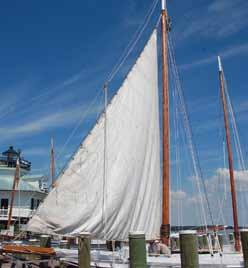
Next up was the fabrication of new frame ends, made of white oak and attached using epoxy and 10-inch ship lap scarf. To tie the whole structure together, 10 new floors were fabricated and drifted into the keel and then bolted
onto the frames. Six planks of yellow pine were bent and fastened.The 1-5/8-inch thick planks had to be steamed to make the dramatic twist from amidships to rabbet on the stem.The planks will be traditionally faired and caulked, making the bottom ready for a good scraping and a fresh coat of paint. Future stages of the project include replacing interior deck beams, sheer clamp, and carlins under the engine room cabin.
The house will also have to be jacked back up to original height as the scarfed carlins being replaced have settled over the boat’s 100-year lifespan. With an estimated completion date of late February 2012, Delaware will then receive new paint and detailing all around.
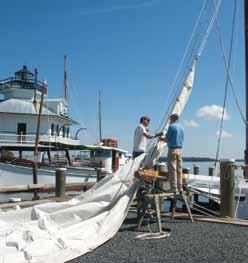
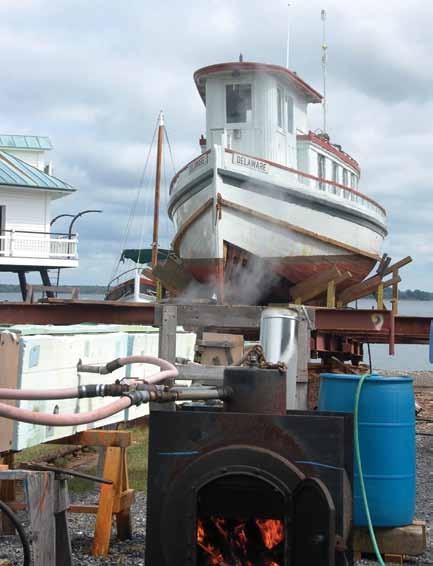
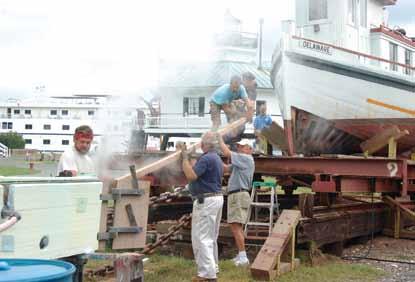 -by Mike Gorman
-by Mike Gorman
In September, the boatyard crew worked to replace all of the rope rigging on the bugeye Edna E. Lockwood Her sails were lifted for the first time in three years. The centerboard trunk was reinstalled and the davits (which hold the pushboat) were reattached. No major work on Edna is planned for the winter. In the spring, the boatyard crew will replace the ballast weights, which are used to stabilize the vessel as it sails. The previous ballasts, 4,500 pounds of steel, were removed last year, and will be replaced with heavier and more lasting lead ballasts.
Apprentice For a Day public boatbuilding program
Learn traditional boatbuilding under the direction of a Museum shipwright. You can be part of the whole 17-week process or just sign up for those aspects of building that you want to learn. Must be 16 or older unless accompanied by an adult. For the Journeyman’s Special, choose any four days for one reduced price! Members $125, non-members $170. Diversify your experience to include several different skills. Gift certificates available. Call 410-745-2916 for information.
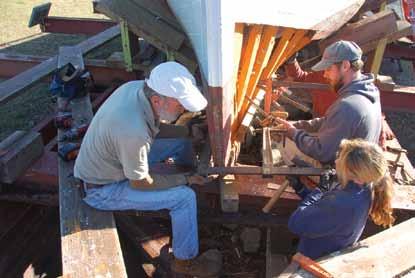
January 7/8 14/15 21/22 28/29 February 4/5 11/12 18/19 26/27 March 3/4 10/11 17/18 24/25 31/1 April 7/8 14/15 21/22 28/29 May 5/6 12/13 19/20 26/27
Keel/skeg/transom Stem/forefoot/transom Box construction, installation Lining off plank, cut gar board, installation

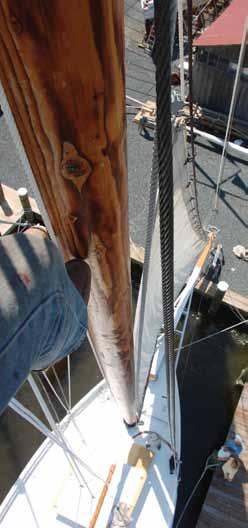
Spiling (plank measuring), cutting, installation Spiling (plank measuring), cutting, installation Interior finish/cut, seal ribs Fit and install ribs
Breast hook, quarter knee construction, installation Inwales, gunwales, seat riser construction, installation Seat constuction and fitting Centerboard, cap construction Oars, spars, bilge timber constuction
Open
Rudder, tiller construction Oarlock,seat knee construction Finishes
Finishes Finishes Hardware installation, rigging Final preparation and launch
19 winter 2012 THE CHESAPEAKE LOG THE CHESAPEAKE LOG winter 2012 20 on the rail
(clockwise from left) Newly steamed and bent spray rails are seen on Delaware beyond the still hot steambox. Delaware’s new rails are quickly taken from the steam box and attached to the tug. Shipwrights Don MacLeod, Jenn Kuhn, Mike Gorman and Ken Philips are bending the garboard plank to get the proper amount of twist before the final fitting.
(top left) Assistant Curator for Watercraft Richard Scofield and Vessel Maintenance Manager Mike Gorman begin hoisting Edna’s jib sail. (bottom left) The old steel ballasts have been removed and are being replaced with lead ballasts. (top right) Gorman takes the camera up the mast with him. (right) Edna’s sails are back up after three years.
on the rail
In the last update of the Rosie Parks restoration, the boatyard crew had just finished the transom, and the in stallation of the first aft strongback and knees underneath the boat’s cabin.
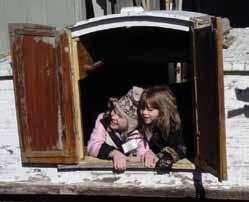
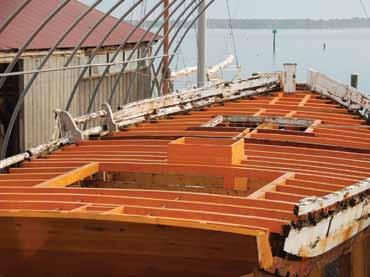
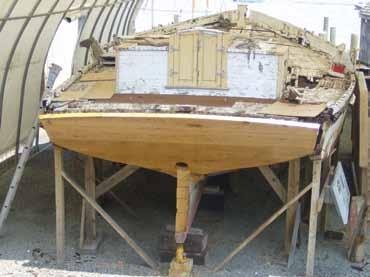
Working on several areas of Rosie simultaneously, the crew continued to replace deck beams while replacing half the frames, about every other one. The frames work to connect the chine log, the topside planks, the clamp, and the deck beams.
Work continued on framing and establishing molds in order to retain Rosie’s
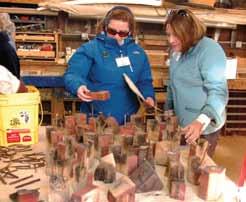
original shape. Sacrificial strongbacks were attached to each new side frame, acting as a mold, so the crew could examine the chine log. In order to expose the chine log and create a pattern for a new one, shipwrights first had to remove half of the lowest topside plank.
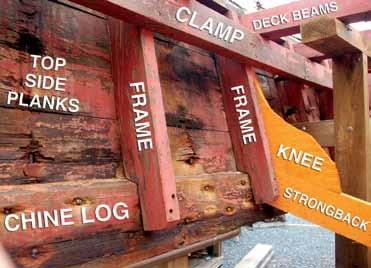
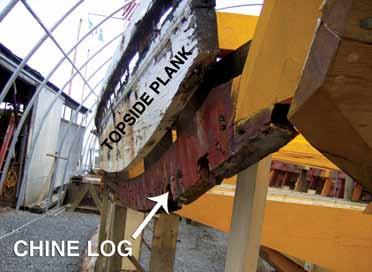
On August 27, Hurricane Irene made her way up the Atlantic coast and work on Rosie was suspended until the storm passed. Thankfully, the only casualty was the tent over Rosie to protect her from the weather. Six thousand dollars later, Rosie’s protective cover has been replaced and work continued with the
removal of the kingplank with a forklift. Shipwright apprentices Bud McIntire and India Gilham-Westerman carefully located the existing mast partner in relation to the mast step, documented their respective positioning and then removed the mast partner and surround ing deck beams. A new mast partner was then fastened into place.
Work continues on Rosie throughout the next two years with updates regularly posted on our Facebook page, and Chesapeakeboats.blogspot.com
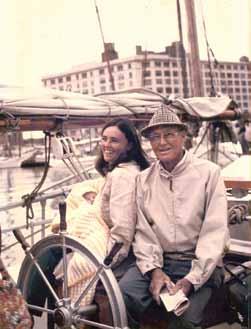
Fifty-seven members of the Parks family, spanning four generations, came to OysterFest to celebrate the restoration of the Rosie Parks. Together with Museum staff and donors to the restoration project, the family reconnected and shared memories of Rosie’s builder Bronza Parks, and his brother Captain Orville Parks. Some of the tools used to build Rosie were donated to the Museum and local Chesapeake artist Marc Castelli gave sketches of Rosie to family members.
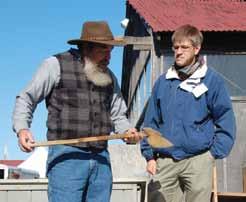
(top left, clockwise) Kelly Ena (great-granddaughter), Sharon Weber (granddaughter), and Karson Ena (great-great-granddaughter) of Captain Orville Parks. Captain Orville with granddaughter Sharon and great-granddaughter Kelly. A group shot of Parks family members, and generous donors to the project, Bill and Maxine Millar, and Ginger Martus and Earl Brannock.
(bottom, clockwise from left) Mary Parks Harding, Joyce Parks Wiley, and Theodore Cephus stand with an actual life-size cut-out of Bronza Parks. Pres Harding presents Chief Curator Pete Lesher with Bronza’s broad axe.
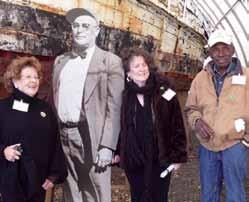
Lesher addresses a large crowd of people. Family members from Captain Orville’s side stand at Rosie’s transom for a group photo. Hannah and Rosalee Kimbro, Bronza’s greatgreat-granddaughters, play inside Rosie’s doghouse. Members of the Parks family take home momentos from the restoration project.
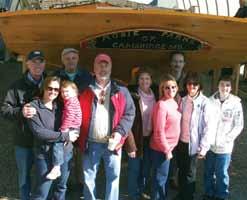
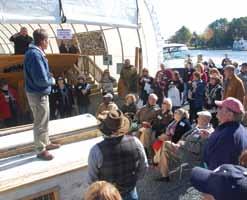
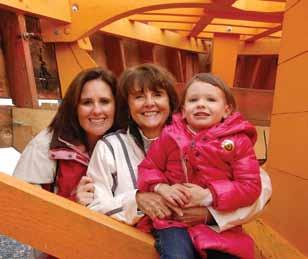
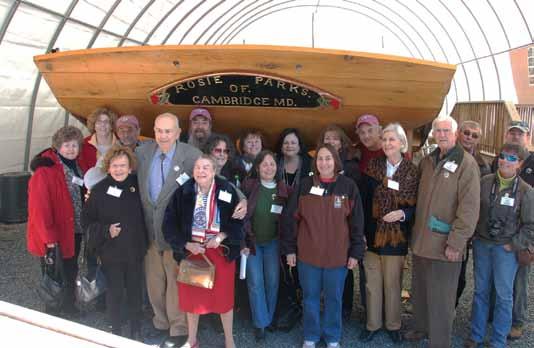
21 winter 2012 THE CHESAPEAKE LOG THE CHESAPEAKE LOG winter 2012 22
(clockwise from top left) Rosie in early August, with a new transom. Rosie in late October, with all new deck beams. The chine log rests underneath the topside planks. The frames work to connect the chine log, the topside planks, the clamp, and the deck beams.
jan/feb/march
Winter/Spring 2012 Lecture Series:
An Abundant and Fruitful Land: Foodways of the Chesapeake, Now and Then
*Space limited and pre-registration is required for all events. Call 410-745-4941.
thursday, january 12
Spirits of the Chesapeake: Taverns, Tankards, and True Stories from 18th Century Maryland $15 members, $18 non-members
6pm, Van Lennep Auditorium
Rod Cofield, director of interpretation at Historic London Town, will share his lively research into the history of tippling in the Colonial Chesapeake, and how primary documents reflect the people, environment, and debauchery of 18th century life in the Tidewater. The lecture will be followed by a presentation from Joe Dolce, man ager of Chestertown’s Imperial Hotel, whose talk about the original colonial “cocktail”, the rum shrub, will be high lighted with tastings and recipes.
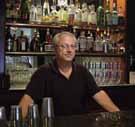
thursday, february 16
Farming for the Future: Diversity and Sustainability at Crow Farm 6pm, $8 members, $10 non-members
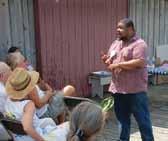
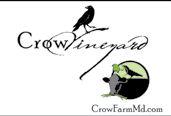
Van Lennep Auditorium
Chesapeake farms today are often hundreds of acres of the “big three”—corn, soybeans, and wheat, but some small farms are thinking outside the box. Representatives from Crow Farm in Kent County, Maryland, will be speaking about their approach towards “staying original” in local agriculture, and how they have built their business on embracing the Bay’s small, family-oriented farming past while innovating with natural, grass-fed beef and pork, farmto-table events, and a new vineyard and winery.
thursday, march 1
Connecting People, Place, and Products: Eating Our Way to a Healthier Bay 6pm, $12 members, $15 non-members
Van Lennep Auditorium
“We have a chance to eat our way back to healthy oceans.”
-Barton Seaver, author of For Cod and Country: Simple, Delicious, Sustainable Cooking.

Join chef and author Barton Seaver, Steve Vilnit from DNR’s Commercial Fisheries Outreach and Marketing, and Carol Bean and Mark Connolly of Pot Pie Farm as they discuss the future of watermen, fishing sustainability in the Chesapeake, and how consumers can protect the environment and community, deliciously. Sample some local seafood and share in this conversation about caring for the Bay through responsible consumption.
Copies of Barton’s book will be available for sale and signing.
wednesday, march 14
We Are What We Ate: African American “Discomfort” Food 2:30pm, $10 members, $12 non-members
Mitchell House
Michael Twitty, community
African-American food scholar, will trace the history of AfricanAmerican Chesapeake cuisine through his experiences growing, preparing, and researching the recipes of enslaved Tidewater Africans. Twitty brings history to life through open-fire cooking demonstrations, and involves his audience in discussions about heirloom crops and seeds, wild foods, foraging methods, and the cooking techniques that create a uniquely African American cultural tradition.
jan/feb/march
Members Nights
friday, january 20
In Concert: Cemetery Cove String Quartet Plus 6pm, Van Lennep Auditorium
Take the chill out of a cold January night and warm up with an evening of easy listening to one of the area’s most soughtafter bands! Sing along to tunes from the 30s and before. Light fare served. Free, but space is limited—RSVP by January 18
friday, february 17
“Magic Lantern Story”
An Evening with Marc Castelli 6pm, Van Lennep Auditorium
may
Frederick Douglass Day
Saturday, May 5
Maritime Model Expo
Sat. & Sun., May 19 & 20
The Elf Classic Yacht Race
Saturday, May 19
june
25th Annual Antique & Classic Boat Festival
Father’s Day Weekend
Fri., Sat., Sun., June 15, 16 & 17
Big Band Night/Fireworks
Saturday, June 30
july
Renowned Chesapeake artist Marc Castelli will share a unique slide show of photographs col lected while out on the water with watermen in all seasons of the year. Light fare served. Free, but space is limited—RSVP by February 15
wednesday, march 14
Marc
Make Your Property More Wildlife-Friendly 6pm, Van Lennep Auditorium
Andi Pupke with Chesapeake Wildlife Heritage will discuss backyard wildlife habitat planning and management.The presentation is designed to provide guidance to land owners on small scale projects to enhance the habitat value on their property. Light fare served. Free, but space is limited—RSVP by March 12.

Member Nights depend on winter weather conditions. In the event of bad weather, please call the Museum to check if the event has been rescheduled.
Exhibit Explorations - January 24, 10am
The final exhibit exploration of winter will feature a talk about Gilbert Byron and his work by the head of the Gilbert Byron Society, Jacques Baker, in the Van Lennep Auditorium.This talk is free, and open to volunteers and docents as well as the public. Registration required.
Contact Helen Van Fleet at hvanfleet@cbmm.org or by phone at 410-745-4941 to register.
Chesapeake Folk Festival
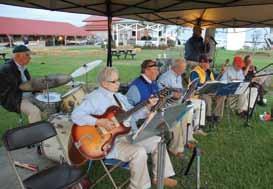
Saturday, July 28
august
Watermen’s Appreciation Day
Sunday, August 12
september
15th Annual Charity Boat Auction
Labor Day Weekend Saturday, September 1
15th Annual Boating Party Gala Fundraiser
Sunday, September 8
St. Michaels Concours d’Elegance Sunday, September 30
october
30th Annual Mid-Atlantic Small Craft Festival
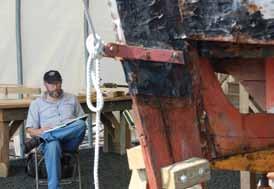
Fri., Sat., Sun., October 5, 6 & 7
november
OysterFest Saturday, November 3
The Cemetery Cove String Quartet played recently at the Museum’s Maritime Monster Mash in October.
calendar
Castelli sketches the Rosie Parks before the start of the three-year restoration process.
23 winter 2012 THE CHESAPEAKE LOG THE CHESAPEAKE LOG winter 2012 24
rod Cofield
Joe Dolce
Michael twitty talks about food at the Chesapeake Folk Festival.
Barton Seaver
CBMM Annual Fund Honor Roll
We’re grateful to supporters whose gifts allow us to continue to preserve and share the stories, traditions, and heritage of the people who have lived, worked and played along the Chesapeake Bay for generations, and still do today. Thank you to all our generous donors, including those listed below whose Annual Fund gifts were received between July 25 and November 7, 2011. Your gifts benefit the children and adults served by our educational programs, special events, exhibits and boat restoration programs. They also will help us fund the Museum’s extremely critical project of replacing the rotted bulkhead along Navy Point this winter. Thank you for your support! You are our heroes!
Theodore & Lottie Aepli
Nancy Aldrich
Herbert & Della Andrew
Jay & Judy Anglada
Anonymous
Antique & Classic Boat Society, Inc.
CG & Nancy Appleby
Eric Applegarth & Michele Zacks
Ashby Commons, L.C.
Richard Awalt
Malcolm Bahrenburg
Glenn & Kimberly Baker
Bill & Nancy Baker
Thomas & Linda Barbour
Robert Barker & Jill Schneider
Jeffrey & Catherine Barron
John Bayley
Robert & Margaret Begor
Thomas & Carolyn Berger
William & Joan Bertolino
Arthur & Alison Birney
Bernard Bise
Carole S. Bishop
Sylvester & Mary Bollinger
Perry & Aurelia Bolton
Robert & Mary Jane Booker
Stephen & Arlene Bowes
David & Lydia Boyer
David A. Brannan
John & Elizabeth Breyer
Samuel Brinton
Thomas & Victoria Broadie
Paul & Jennifer Brooks
Pam and Dennis Pitt of Hurlock, MD, are two of the newest members of the Chesapeake Bay Maritime Museum’s Perpetual Mariner Society which recognizes supporters who have included the Museum in their estate plans. The Pitts have a special love of the Museum’s floating fleet, and one vessel in particular, the 1889 nine-log bugeye Edna E. Lockwood which is the only survivor of more than 600 original bugeyes that once sailed the Bay.
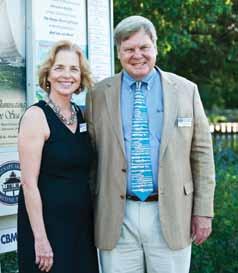
Pam’s father, Reginald D. “Raggy” Todd, was Edna’s skipper from 1948 until the late 1950s, and he was out sailing aboard Edna the day Pam was born. Though the Pitts have placed no restrictions on how their legacy gift may be used by the Museum, they’ve said they want to make sure Edna and other historic vessels in the Museum’s floating fleet are around for future generations to enjoy.
“This is a very sensible thing to do for those who cherish the Museum’s work and wish to demonstrate their support
in an enduring way. Barely one-third of the Museum’s operating budget comes from admissions and membership dues. Charitable gifts, including bequests and endowments, always will be the mainstay that sustains the Museum’s performance of its important mission,” says Museum President Langley Shook.
“In fact, when Pam and Dennis told us of their plans, this reminded my wife Karen and me to include the Museum in our own estate plans. We’ve taken care of that in our wills and we’re proud to join the Perpetual Mariner Society alongside the Pitts. I believe everyone who loves the Museum and wants to ensure it thrives and fulfills its mission far into the future should give serious consideration to this.”
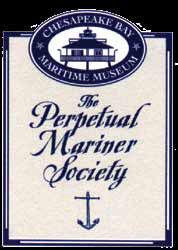
To include the Museum in your estate plans, contact René Stevenson at 410-745-4950 or rstevenson@cbmm.org.
(top) Pam and Dennis Pitt (front) treated the boatyard crew to lunch to celebrate their new status as members of the Perpetual Mariner Society. (back row, from left) Mike Gorman, Don MacLeod, Richard Scofield, and Langley Shook.
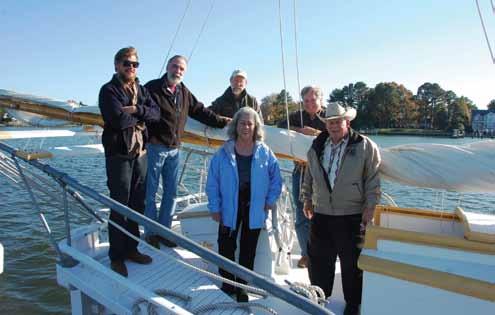
(bottom) Karen and Langley Shook.
Stanley & Katharine Brown
Richard & Mary Browne
Joan C. Burke
Burr Yacht Sales, Inc.
Ned & Jennifer Cabot
Nancie Cameron
Dennis Caprio
Timothy & Patricia Casgar
Eric & Carol Chandler
Manson & Durrie Chisholm
Choptank Electric Cooperative
Larry Clark
Stephen & Linda Clineburg
Katherine L. Clovis
Robert & Viola Clum
Doug & Debbie Collison
Lee & Karin Cowperthwait
Wilbur & Barbara Crutchley
John M. Csady
Clyde & Mary Ellen Culp
Anne Dahlquist
Jean DeBell-O’Neal
Carolyn Decker
William Dempsey & Elizabeth McGrory
Jack & Mary Doetzer
Bill & Donna Dudley
T.P. & Judith Dunn
Gray & Charlotte Ehlig
Elm Street Development
Larry & Nancy Englert
The Eringis Family
Mary Jane Fairbank
Lillian Fairbank
Randy & Dana Fairbank
Jean B. Farmar
Joseph & Rosemary Fasolo
Allan & Linda Field
William & Ann Fink
Jelles Fonda & Kathryn O’Connell
Tom & Jane Ford
Clark & Mary French
Edward & Nancy Frey
Jerry & Barbara Friedman
Andrew H. Friel
Earl & Christina Furman
Brice & Carol Gamber
Richard & Trina Gelfond
James & Gloria Gibson
David J. Gierisch
Bill & Terri Gilmore
William & Katherine Ginder
James & Leeann Ginn
Shirley S. Gooch
Robert & Michele Goodson
Thomas & Judith Gould
Alice Marie Gravely
Ernest & Kathryn Greene
Alan & Penny Griffith
George H. Gronde
Gene & Elizabeth Guthrie
Leeds Hackett & Victoria McAndrews
Henry & Sandy Hale
Steven & Anna Hall
Jim & Pam Harris
Donald Harrop
Hattons Garden, LLC
Udo & Cornelia Heckenbach
Thomas S. Heckman
Martin & Ada Heilman
Hunt & Joan Hendrickson
Stephen & Kathleen Hendry
Robert & Martha Ann Henneberry
Howard R. Hill, Jr.
Robert & Susan Hillenbrand
Douglas & Tracey Hodges
Donald & Hertha Holland
Clifford & Jacqueline Holland
Richard & Suzanne Hood
Jerry Hook & Jacqueline Smith
Porter & Pati Hopkins
Francis & Jane Hopkinson
Judge William Horne
Donald & Barbara Hoskins
Joseph & Louise Huber
Gordon & Elizabeth Hughes
Diane Humphrey
Betty T. Hurford
Joseph & Mary Irr
Raymond Jennings
William G. Joerger
Clark Johnson & Karen Johnson-Amritt
Chris & Holiday Johnson
Bruce Jones
Eugene & Diane Katz
Douglas & Sharon Katz
Joan K. Katz
Lawrence & Jeanne Kelly
Fred & Marcia Kieser
Charles & Christine Kohls
Jim & Tonia Kulp
Michael L. Laccheo
William & Robyn Lake
Ray & Shirley Landon
Ed & Linda Langley
Thomas & Deborah Lawrence
The Estate of Helen B. Leinberger
Thomas & Rollin Leitch
Ted & Pat Lewers
Robert J. Lewis
John & Deborah Lindinger
Robert & Marsha Lonergan
Robert Loughhead
Donald W. MacLeod
Joel & Debi Maness
Gordon & Linda Mansfield
Richard Manzer
Frank Marshall
David & Kirsten Martin
Edward & Arlene Masters
Max & Ruth Matteson
Karl & Quadalupe Matthes
William & Anne Mattimore
Carolyn & Robert Mattingly
Lawrence & Carol McCanna
Michael McCluskey
Glenn G. McDonald
Thomas & Constance McEvoy
James & Laura McGrath
Paul & Digie McGuirk
Fred & Nancy Meendsen
Russell M. Memmer
John E. Menard
Russell & Carol Merritt
Harry & Mary Jo Meyerhoff
Marilyn & Alan Meyers
Douglas & Donna Michalek
Dick & Alice Miller
Edward & Suzanne Mitchell
Paul Moates & Connie Sadler
Maurice J. Montaldi
James & Debby Morrison
Tracey F. Munson
Lawrence & Kathy Murphy
Erik Neil & Luisa Adelfio
Paul A. Nelson
Michael & Janis Nesterak
Mike & Suzan Newnam
Elizabeth Ney
Rob & Ceci Nobel
David & Joan North
Douglas & Mildred North Milton G. Nottingham
Richard & Caroline Ober
Donald & Margaret Ofte
Carl & Gwendolyn Oppenheim
Margaret D. Orem
Glenn & Elaine Orme
John & Wendy Pagenstecher
Arthur & Barbara Patterson
Royce A. Peabody
Jerry & Leigh Peek
Joe & Mary Lou Peters
Jerry & Edna Pettit
Lee & Electa Phillips
Christine A. Phillips
Wesley & Jane Pipes
William & Elizabeth Platt
Norma Redelé
Miles Reidy & Mary Elizabeth Aichelmann-Reidy
Margaret Rennels
Bob & Phoebe Reynolds
Tom & Trish Reynolds
Claire A. Richardson
Ride Entertainment Systems
Fritz & Mary Riedlin
Kenneth S. Roberts
Charlie & Carol Robertson
Martha B. Roe
Bruce & Alice Rogers
Adrienne W. Rudge William Russell
Michael & Nancy Sandmann Thomas C. Schatz
David & Mary Segermark John Seifarth
Shady Park, Inc.
Michael & Marcia Shannon
Harry & Carol Sharp
Langley & Karen Shook
Nancy S. Shook
William & Anne Simmons
Edward & Nancy Sipe
David & Rita Sirignano
Cyrus & Deborah Smith
Albert L. Smith
George & Lynne Snyder
Charles & Caroline Sproule
James & Brenda Stansbury
Tom & René Stevenson
Glenna Stewart Harvey & Carol Stewart Barbara A. Stewart
Roger & Sally Stobbart
Kenneth & Margaret Strassner Clifford & Carol Stretmater
Kevin & Rachel Tandy
Warren & Mary Tarte
Richard & Kathleen Taylor
Walter & Amy Teesdale
Peter & Rosemary Therkelsen
Stephen & Marie Thomas
Susan B. Thomas
Rosemary E. Thomson
Benjamin & Margo Tilghman
August & Nancy Tolzman
Scott & Julie Tompkins
Russell & Aileen Train
Michael & Sandra Twigg
Alfred Tyler & Cleo Braver
Helen Van Fleet
Robert & Mary Van Fossan Barbara Viniar
Salvador & Peggy Waller
John & Maggie Warfield
Charles & Ann Webb
Alan & Judith Werner
Annette T. West
Clifton & Joan West
Tom & Donna Whalen
Harry & Janet Will
Marianne J. Williams
William A. Williams
Katie Willis
Clement & Mary Louise Wilson
David & Crissi Winans
Wood Realty
Lane & Barbara Wroth
Edward & Mary Jane Wyant
Mrs. Roslyn D. Young, Jr.
Michael & Kay Young
Tim & Julie Zaring
25 winter 2012 THE CHESAPEAKE LOG THE CHESAPEAKE LOG winter 2012 26
Chesapeake Bay Maritime Museum Navy Point, PO Box 636 St. Michaels, MD 21663 cbmm.org, havefun@cbmm.org 410-745-2916
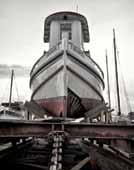
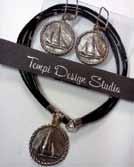
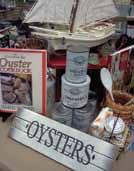

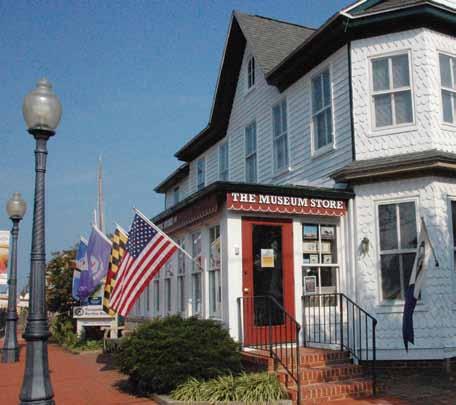
take home something special along with your Museum memories. Museum members get store discounts, and your purchases support the children and adults served by our educational, exhibit, and boat restoration programming. books • jewelry • artwork • model kits clothing • ceramics • toys • ornaments housewares • keepsakes • and more Chesapeake
• 410-745-4962
Non-Profit Org. US Postage PAID Chesapeake Bay Maritime Museum
Bay Maritime Museum Store cbmm.org/store
























 By Katie Willis
By Katie Willis


















 by Pete Lesher
by Pete Lesher













 -by Mike Gorman
-by Mike Gorman






























